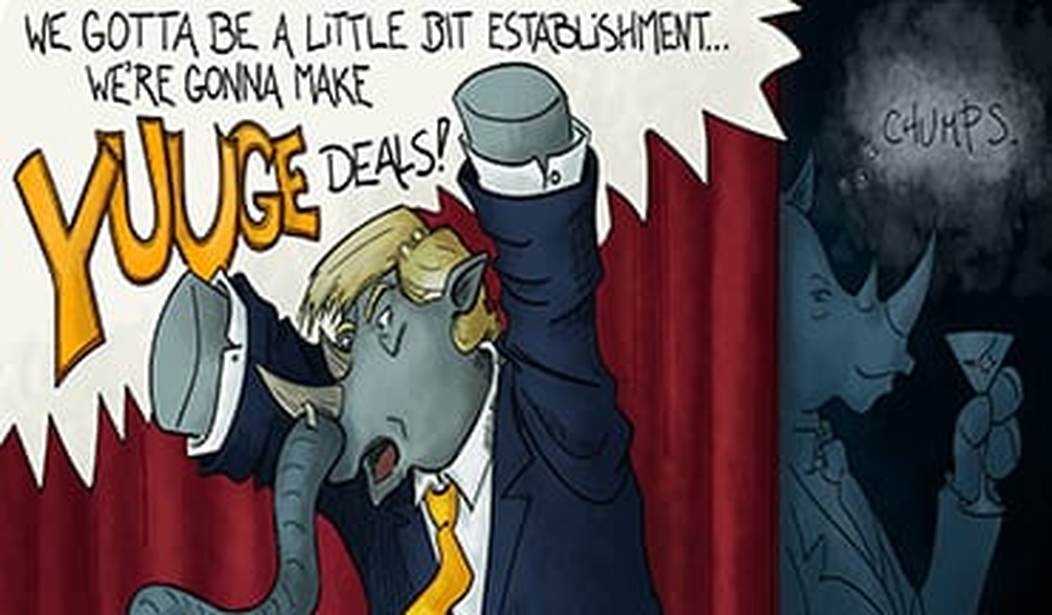With less than a week to Iowa’s caucus, Donald Trump has convinced enough elected officials, insiders, and lobbyists to prefer him to Sen. Ted Cruz. A field of economics known as “public choice” explains why: Trump threatens their interests less than Cruz.
Trump is the candidate of bread and circuses. His rallies feature immense crowds that show up to hear him insult, gloat, boast, growl, bark. Trump is spectacle by design. His campaign operation compares favorably to the French philosophy behind professional wrestling. The wealthy reality TV star rents movie theaters and entertains fans with a combination of ego and promises that would make Shakespeare’s Mark Antony proud: free health care, protectionist trade barriers, and gallant military conquests, all funded by taxes on other people. Had President Obama not tainted the imagery in 2008, I could easily imagine faux Roman columns behind the golden-headed populist.
And honestly, after seven years with an entertainer-in-chief reducing politics to parody, I’m not surprised that a large number of people just want to change the channel. Millions of Americans justifiably feel like President Obama and his loyal opposition in the Congress have ignored them, playing a boring game show where they win and the viewers at home lose. If they want to send a gladiator to fight for them, why send not an entertaining one?
But because Republican elites spent the first seven months of Trump’s presidential campaign treating him like the Sweet Meteor O’ Death, I thought as soon as the party was confronted with a choice between Trump and the consistent conservative candidate of Cuban ancestry, the party would surely come to its senses and realize: it’s Cruz or Lose. “Better Ted than dead,” I vainly imagined GOP insiders saying, as they grudgingly helped launch the Cruz missile to bring down the entertaining handout model of government Obama has only made worse.
But when Cruz became Trump’s alternative, the GOP suddenly started cozying up to the nationalist poll leader. The 1996 GOP candidate Bob Dole (who, I admit, I was unaware still lived) came out of the shadows to say Trump has “got the right personality.” Rudy Giuliani emerged for the first time since winning exactly no states in 2008 to say he’d vote Trump over Cruz. Even Sen. Chuck Grassley introduced Trump on the stump. Why the sudden peace with would-be Caesar?
Trump will make a deal, that’s why. Trump beams that he could be “a little establishment.” Trump can be coached, cajoled, and brought on board. Some of his supporters may be radical Malcolm X-supporting loose cannons, and others might be principle-free smooth operators, but it is loyalty to the celebrity and the benefits he promises that holds them together, not policy or governing principles. Trump has bread for the insiders, too, and his circus antics have convinced some party leaders of the fantasy that he could actually win a general election.
Trump and Cruz represent radically different ways of hiring and appointing the managers of our federal Leviathan. Cruz only asks that you support the Constitution we inherited from our founders. Trump only asks that you kiss his ring. Cruz will reward loyalty to principle. Trump will reward loyalty to him.
Cruz has rallied a grassroots cavalcade of Tea Party activists and true believers. Cruz World is populated by what he calls “courageous conservatives,” but unlike when many joined the fight in 2010, they are now battle-scarred political veterans. And he has provided this movement with newfound discipline, funding, tech-savvy, and maturity.
Cruz offers reform. He affirms limited government constitutionalism, which means reducing the avenues for crony capitalism disguised as tax incentives. He means to reorient our national trajectory toward smaller government, foreign policy realism, and constitutional order. A vote for him is a vote for specific actions by a capable leader who can actually accomplish his aims – low taxes, secure borders, a strong military, respect for life and religious liberty, and putting the federal government on a diet. A small cadre of influencers stand to lose a lot from these reforms. True to James Buchanan Chicago School public choice theory, they choose to oppose him.
Not so Trump. Trump’s political positions are a lot like his hair: pasted on for effect and flopping whichever way the wind blows.
A vote from Trump represents a vote for a sentiment, not a policy program. To his crowds, voting Trump is symbolic: an affirmation of a country that was once great and can be made great again – through triumphant will. It is not a vote to end government redistribution, just to change which people benefit from redistribution. It’s not a vote to change the rules – just to change who wins the game. Trump won’t touch the bloated administrative state; he’ll ride it with pro-American rhetoric. And that means the tax code will remain full of “planning opportunities,” energy mandates and subsidies and blend walls will persist, and our foreign policy will be as erratic and ineffectual as ever.
Trump won’t upset the apple cart. Cruz will. Trump can be persuaded with polls and proposals. Cruz cannot be. Thus the elites’ support for Trump.
Perhaps Mr. Niccolo Machiavelli himself put it best: “in the introduction of changes, [a leader] will have for his enemies all those who are well off under the existing order of things.” Unlike Trump’s initial supporters, the establishment figures coalescing behind him now are pretty well off under the existing order.









Join the conversation as a VIP Member